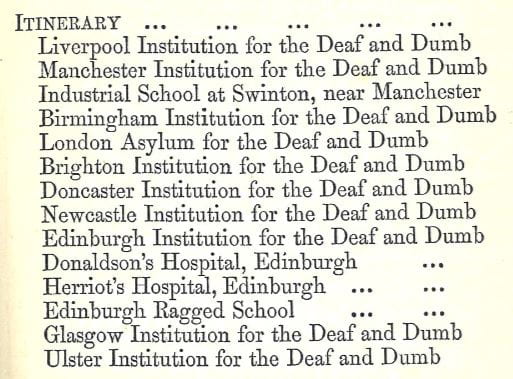“Mr. M’Diarmid, of Donaldson’s Hospital, who, without any facts… upon which to ground his opinion, has arrived at a different conclusion”
By H Dominic W Stiles, on 13 September 2019
In 1856, two members of the Committee of the National Deaf and Dumb Association of Ireland, that started the Claremont Institution, came to Scotland and England to examine the major education institutions for the Deaf, and how they were run. The Honorary Secretary was John Ringland (1816-76), of 14 Harcourt Street, Dublin, a midwifery doctor at the Coombe Lying In Hospital – he was ‘Master of the Coombe’ from 1841-76, and Mr John Gelston.  I could not find out anything interesting about him in the time available.
I could not find out anything interesting about him in the time available.
Here we have a list of the institutions they visited. As you will see from the title page, Gelston was with the Inland Revenue.
The introduction to the report credits Harvey Peet’s Report on European Institutions, and Ringland says (p.4), “It affords us much satisfaction to be able to state that in most of his views we entirely concur with Dr. Peet: in the few trifling points upon which we differ with him, we do so with extreme unwillingness, as we feel assured that the conclusions he has arrived at have been the result of unprejudiced judgement, and of earnest convictions.” One section where they did disagree with Peet was the ‘separation of the sexes’:
With but two or three exceptions, namely, Edinburgh, Donaldson’s Hospital, and, we believe, one other, all the pupils, both male and female, take their meals at the same time in a common hall; but in all we found that there was a separate play-ground for each sex, and that, excepting during the time already stated, they are kept strictly apart. We think it right to observe that at Glasgow the play-grounds are separated by a very low wall, which answers the purpose merely of marking out the point of separation.
With the exception of Mr. M’Diarmid, of Donaldson’s Hospital, who, without any facts, however, upon which to ground his opinion, has arrived at a different conclusion, the Principals of all the Institutions we visited highly approve of these arrangements, so almost universally adopted, and do not believe that any immorality has ever resulted from them, but, on the contrary, consider that they have been the best means of preventing any tendency to it.
In reference to this point, we cannot help quoting the opinion of Dr. Peet, of New York, who in his very interesting report of his visit to the different Institutions for the deaf and dumb in Europe, expresses his conviction, “that the effects of such a system—namely the strict separation of the sexes—would be evil.” He subsequently goes on to say that “with us the sexes, accustomed daily to see each other, are also accustomed to self-control, to the habitual decency of thought, manner, and expression ; are accustomed to put down truant thoughts by religious and moral motives ; are impressed strongly with the truth that their future happiness in this life will mainly depend on their present good conduct ; and, in short, are under all the moral influence that in families and in society preserve the virtue of the young. If for this moral control, aided by a constant supervision, we should substitute strict seclusion from intercourse with the other sex, should we not impress our pupils with the idea that in circumstances of temptation their fall would be inevitable ? If we treat virtue as a hot-house plant, will it endure as well when removed from our conservatory to take its chances in the open air.” (pages 17-18)
I have scanned the whole report with the exception on the Appendix 3, which is a large table covering the differences in how the schools approached certain things, such as the time of meals. I have however photographed it, but if you have trouble reading it, come in to see it here!
Report of a Deputation from the National Association for the Education of the Deaf and Dumb Poor
 Close
Close


